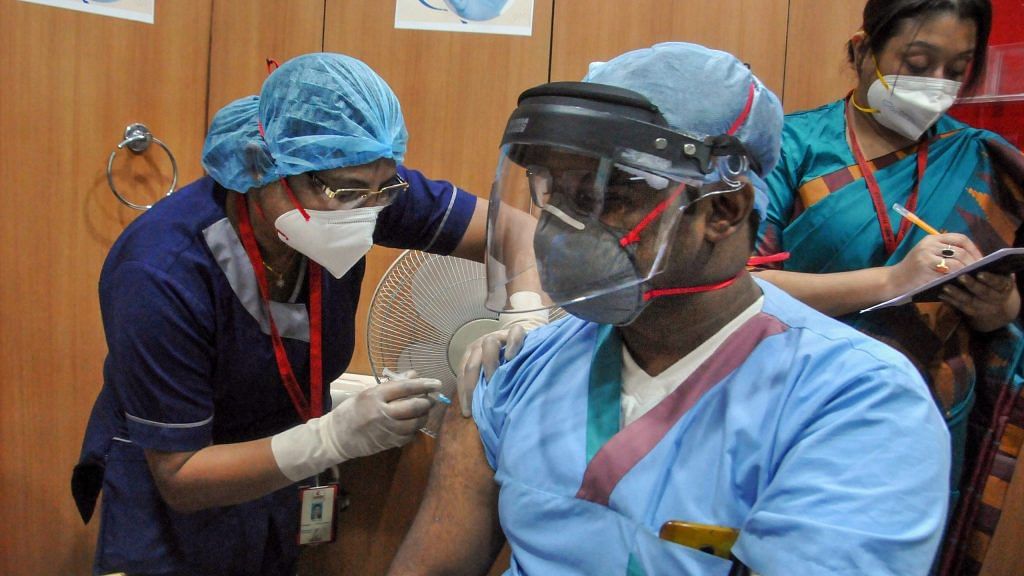New Delhi: Even as the central government has asked states not to procure coronavirus vaccines from manufacturers on their own, the Health Ministry Tuesday put the onus of tackling vaccine hesitancy on states.
Replying to a question on how the government plans to tackle vaccine hesitancy, Health Secretary Rajesh Bhushan said: “Vaccine hesitancy is there in all countries. The degree will be slightly more across countries for Covid because it is a new disease, it’s a new vaccine, there are more confusions. We have seen vaccine hesitancy in polio, measles-rubella and pentavalent vaccines (all three are administered in children). The only way of addressing it is by engaging repeatedly with beneficiaries and trying to address their doubts and confusions. That is our advice to all state governments.”
Bhushan also said that none of the post-vaccination deaths in Uttar Pradesh and Karnataka have been causally related to the vaccine, adding that India’s record of AEFIs post-vaccination, with either Covaxin or Covisheld, is among the “lowest in the world”.
Uptake of Covid-19 vaccines during the first three days of vaccination — the programme kicked off Saturday — has been variable, ranging from 27.9 per cent in Punjab to 89.3 per cent in Lakshadweep, according to the data shared by the ministry.
The cumulative number of healthcare workers vaccinated against Covid touched 6,31,417 till 6 pm Tuesday through 11,660 sessions, as per the provisional report.
‘Take vaccine as a duty to yourself & society’
Earlier, when the vaccine flow had not started, the government, in several meetings, had told state governments not to move independently on vaccine procurement. The first tranche of three crore vaccines for health workers and frontline workers are being paid for by the Centre.
Appealing to healthcare workers to come forward for the vaccination, Dr V.K. Paul, member (health) NITI Aayog said: “Good communication and understanding facts behind the vaccine is important. I would say take it as a duty to yourself and society.”
The Covid vaccination programme is voluntary. Any beneficiary is free to refuse the vaccine though they cannot decide which one to take.
Dr Paul himself had taken a Covaxin shot — manufactured by Bharat Biotech— on 16 January, the first day of the vaccination drive. “I have taken Covaxin and I have zero side effects,” he said.
Also read: 52 adverse events after Covid vaccine reported in Delhi on first day of immunisation drive
Robust system for AEFI monitoring
Bhushan tried to allay fears about post-immunisation events by pointing out that India’s record of an adverse event following immunisation (AEFIs) in 0.18% people who had received the vaccine and hospitalisation in 0.002% people is way lower than the global average, even though India’s robust mechanism for monitoring of AEFIs means that no event is missed.
“Even a little anxiety, hysteria after vaccination is recorded and classified as AEFI when it goes away after a while … monitoring for Covishield is passive as it is the onus of the recipient to report AEFIs. In case of Covaxin, the doctor rings you up to check,” he added.
He also said that while the government decided how much of each vaccine variant to give to states, it was the state governments that took a call on which sites would give Covaxin and which sites would have Covishield.
“Vaccines were distributed to the states in the proportion in which the Union government got the supplies. Which vaccine will go to which session was a decision left entirely on the states. States have taken a decision. Government of India did not decide which vaccine will be given in AIIMS, New Delhi; Delhi government did. We believe state governments are in a position to do this kind of micromanagement better,” he said.
A total of only nine AEFI required hospitalisation. In Delhi, three cases have been discharged and one case is under observation at Rajiv Gandhi Hospital in Shahdara. One more AEFI case from Uttarakhand has been discharged. In Karnataka, one person has been discharged and other person is stable and under observation at District Hospital, Chitradurga. In Chhattisgarh, one person has been discharged. In Rajasthan, one case of suspected anaphylaxis is fine and under observation at District Hospital, Bangar, the Health Ministry said.
Describing concerns related to side-effects as unfounded, Dr Paul said: “AEFIs have been negligible, they have been so less that we should say less than negligible. These two vaccine are safe and there is no undue reactogenicity … If doctors and nurses are refusing, it is sad. I request them to take it because we do not know how long the pandemic will go on and this will make our health system Covid-proof so that we can restart all other services.”
Also read: Fewer than 50% healthcare workers get the Covaxin shot at 6 central hospitals in Delhi
